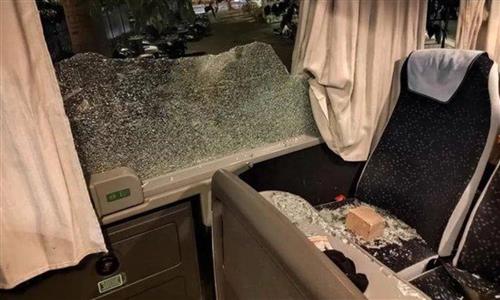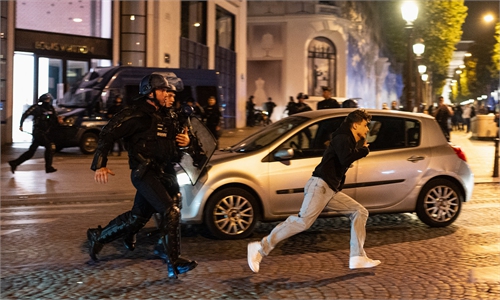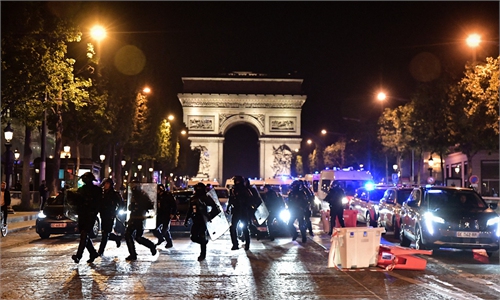IN-DEPTH / IN-DEPTH
Witness to history: Chinese tourists recall harrowing moment of bus attack in Marseille amid French riots
Powder keg of unrest
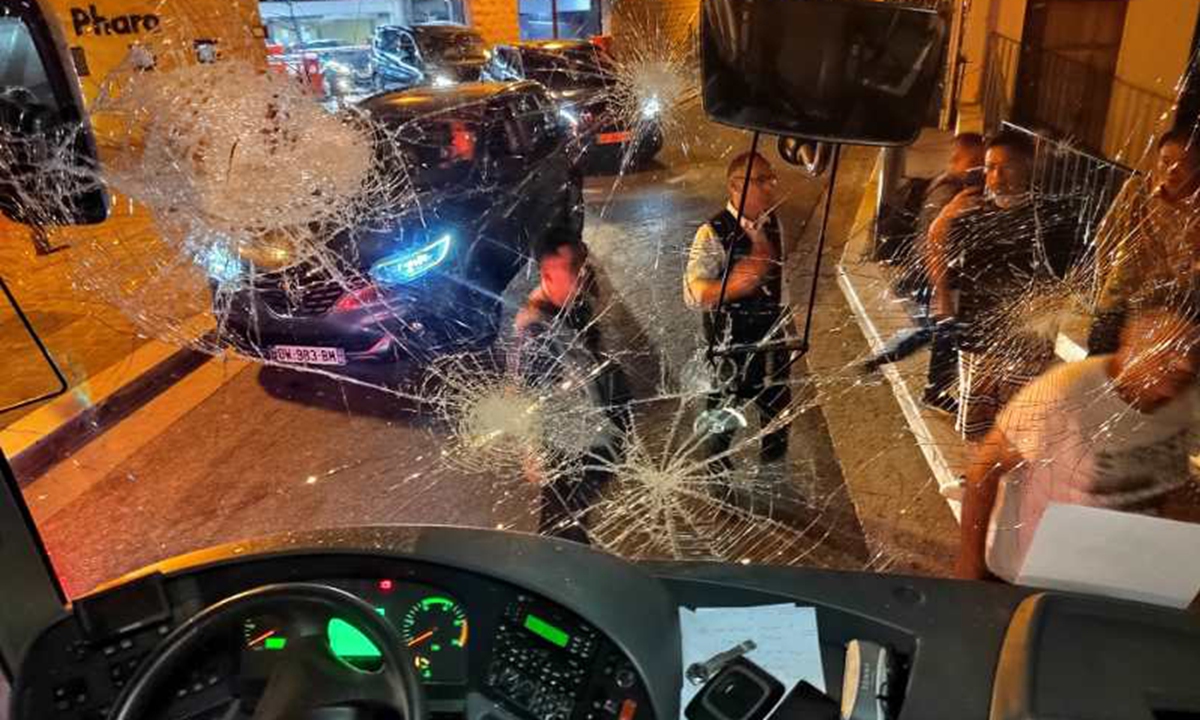
Black-clad rioters surround and smash the windscreen of a bus ferrying Chinese tourists in Marseille, France, late June 29, 2023. Photo: Courtesy of a Chinese tourist surnamed Li
Editor's Note:The death of 17-year-old Nahel Merzouk, who was shot by police during a traffic stop in a Paris suburb on June 27, has prompted violent protests in many regions across France as people have taken to the streets in consecutive nights of protests, setting cars alight, hurling stones and fireworks, and ransacking shops.
The safety of tourists and businesses in the city of Paris was brought into focus after a tour bus ferrying 41 Chinese tourists was attacked by a group of black-clad rioters in Marseille on the night of June 29.
How did these Chinese tourists become targets of an attack? What dangers did the Chinese-owned shops in Paris' 13th district face in the wake of the unrest? Why did a protest escalate into nationwide riots? How do Chinese people view France's deep-rooted racial issues? The perspective of the Chinese community in France opens a small window to understanding the complete story.
This story is a part of the Global Times' series of "Witness to history," which features first-hand accounts from witnesses who were at the forefront of historic moments. From scholars, politicians and diplomats to ordinary citizens, their authentic reflections on the impact of historical moments help reveal a sound future for humanity through the solid steps forward taken in the past and the present.
Although it has been over 48 hours since the attack, Li is still haunted by the images of the attackers who besieged their tour bus in Marseille, vandalizing their vehicle and smashing windows. Li tightly held her daughter and all she could think was how she could possibly protect her family from the onslaught.
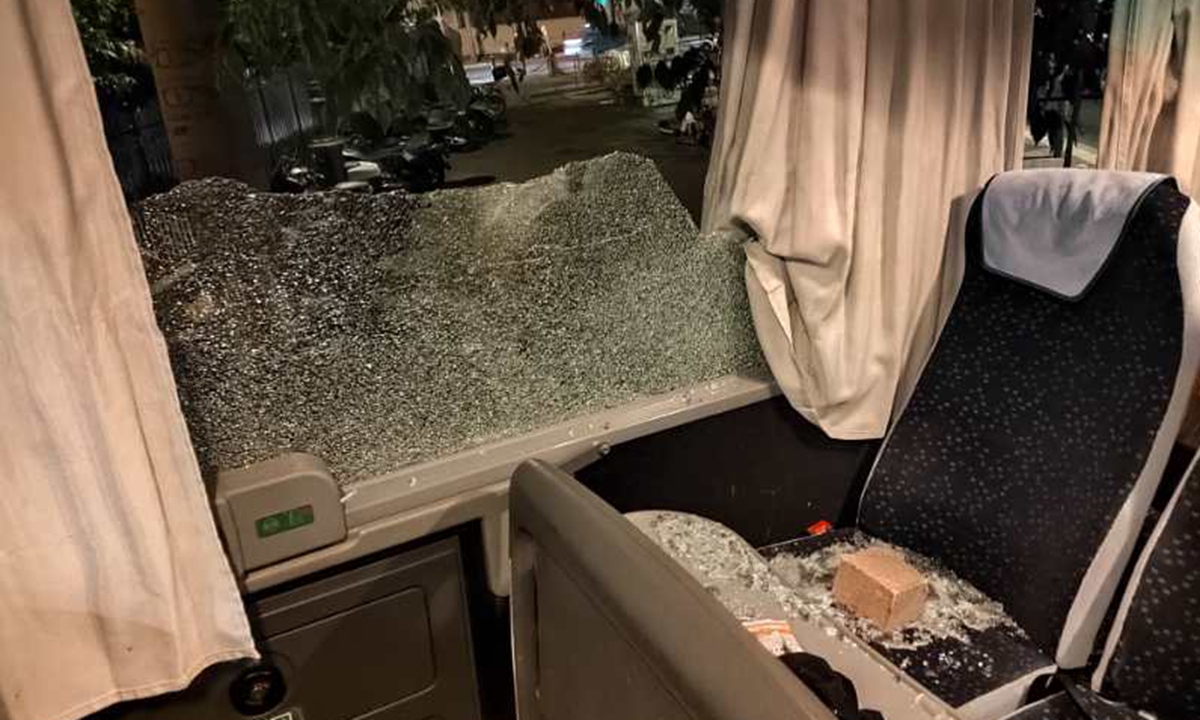
Shards of glass from a tour bus ferrying Chinese tourists are scattered across passenger seats after vandalism by rioters in Marseille, on late June 29, 2023. Photo: Courtesy of a Chinese tourist surnamed Li
Li could have never imagined that her 13-day luxury Europe trip, which cost about 23,000 yuan (roughly $3,171) per person covering popular Schengen countries including Italy, France, and Switzerland, would become a nightmare on the evening of the second day on June 29 after their trip kicked off.She told the Global Times that she, along with her mother and young daughter, were sitting in the last row of seats when the bus departed Italy for Marseille and came across rioters while on their ways to a local hotel in Marseille. The rioters then proceeded to break the windshield with bricks and smashed the rear window.
"I was covered in shattered glass that scratched mine and my mother's backs. My hair also got slashed. Luckily these were just slight surface wounds and my daughter didn't get hurt under our desperate protection. It was far more traumatizing than physically injurious. You can't imagine how fear crept over us when over a dozen black-clad rioters, all tall and thin with masks on, gradually surrounded the bus, shattering nearly all the windows and the navigation," Li said.
Li said a white man smashed the backdoor and broke into the bus with a brick in hand, but the man was immediately expelled by three male tourists who then held the door shut to prevent from others getting in. "I can't imagine what would have happened had more of them boarded the bus. They would probably rob us," said Li, adding that they called the police and after an hour's wait, the police failed to arrive.
"Many of us could not sleep that night due to the psychological trauma we had suffered from the attack. Some even suffered from heart palpitations for several days after the incident," Li said.
According to the itinerary, the tourist group still had a three-day trip in Paris and Provence, but all the tourists required opted out of the France portion of the tour, requesting instead to proceed to Switzerland on June 30. After charging each of the tourists an additional 255 euros in cash, the tourist agency finally agreed to take to group to Switzerland three days in advance.
"It's my first time in France and Europe. I spent a lot of money. But what have I gotten for it? Scratched from broken glass, profound fear, and extortion by the tourist agency! Now I understand how good the social public safety is in China," Li said with wrath.
Li said she's grateful for the assistance offered by the Chinese Consulate-General in Marseille who helped them to call the police while the tourists were attacked on the bus and contacted the tourist group on the next day to make sure everyone's safety.
After the incident, the Chinese Consulate-General in Marseille immediately called on the police to provide urgent assistance to the tourists and requested that arrangements be made by the French side to ensure the personal safety of Chinese nationals and the protection of their property.
"After receiving a distress call from Chinese tourists around 10:40 pm on the night of June, we immediately confirmed their location and helped them report the incident to the police. The person in charge of foreign tour group's safety in Marseille urged us to send someone to investigate the situation promptly. After the situation was resolved, we continuously monitored the safety and progress of the Chinese tourists," He Shuai, head of consular services at the Chinese Consulate-General in Marseille, told the Global Times.
"The Chinese Consulate-General in Marseille has been reminding Chinese nationals to strengthen security measures through various channels. We also promptly contacted the head of the Marseille police authority to express our concerns, and they promised to prioritize the safety of the Chinese residents and tourists, and maintain communication with us at all times," He said.
The Consular Protection Center of the Chinese Foreign Ministry also reminded Chinese nationals, especially tourists, in France, of the local security situation and asked them to stay away from protest areas and violent conflicts.
On the way back to normal
Chinese nationals living in Paris told the Global Times that riots have grown less intense since July 1, as tens of thousands of police have since been deployed in cities across the country, although tensions and sporadic clashes persist in central Paris and the low-income suburbs on the edge of city. Chinatown in the 13th arrondissement of Paris has not been spared.
According to reports, the 13th arrondissement of Paris is the largest Chinese residential area in Paris, with nearly 50,000 Chinese nationals living there.
A Chinese national surnamed Chen living near 13th arrondissement of Paris told the Global Times that she saw shop windows on both sides of Avenue de Choisy being smashed and shattered glass falling onto the sidewalk on Saturday. A few cars and motorcycles on the roadside were razed to their frames, leaving behind a scene of devastation that was shocking to see. The cash register of a Chinese restaurant was also ransacked, she said.
"But the police responded quickly, and the situation has improved significantly over the last two days. Most shops are still operating normally. A few Chinese shops that had their windows broken at night have reinforced them with wooden boards, and the owners said that insurance companies would compensate them for the losses as soon as possible," Chen said.
Yuxuan, a Chinese national who has studies and lived in Paris for years, told the Global Times that she could feel a grave change in the atmosphere when walking down the streets as many stores closed much earlier than before and boarded up glass doors with wooden panels to prevent vandalism. Some bus routes also stopped operations much earlier in the evening.
Yuxuan said whether it be breaking glass or setting a garbage bin on fire, the shooting incident has become a catalyst for many individuals with anti-social sentiments to violently vent their long-existing frustration against social injustice.
Tracking the riots in Chinese eyes
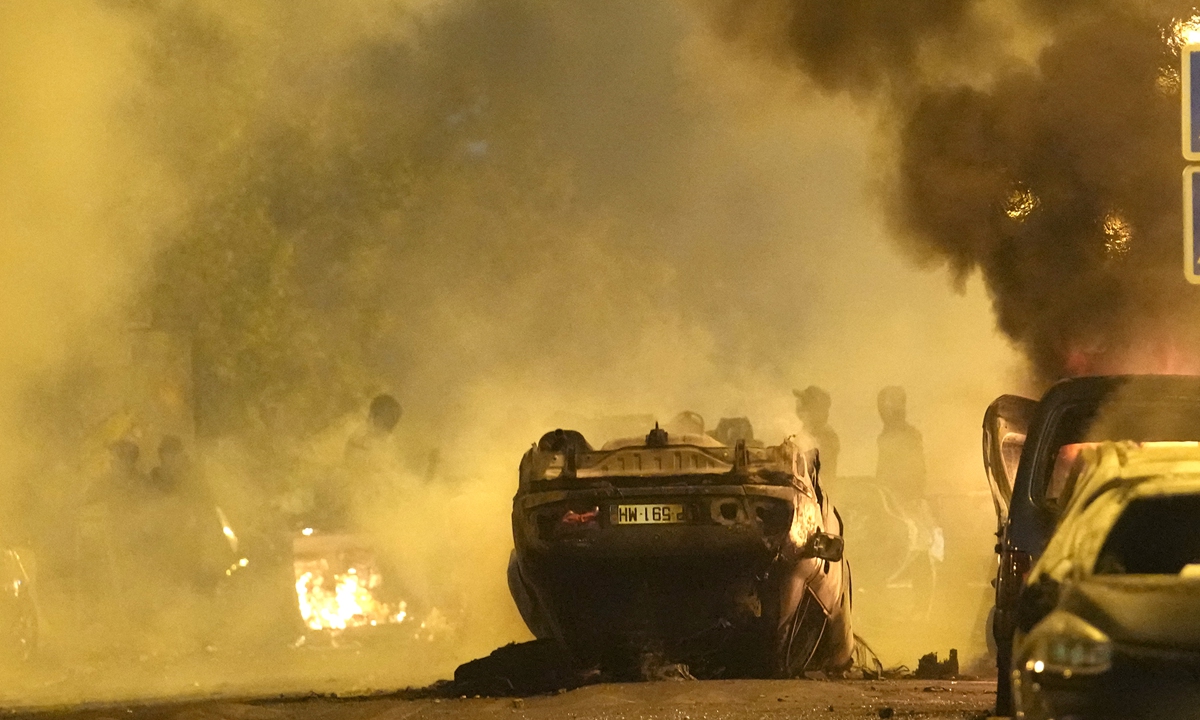
A car burns during clashes between local youths and police in Nanterre, France, on June 29, 2023. Photo: VCG
According to Chinese journalist Yao Meng, who resides in Paris, the initial protests only took place in the Paris suburbs of Seine-Saint-Denis and a few neighboring towns. However, on the evening of June 27, the protests escalated into riots involving looting, vandalism, arson, and clashes with the police. Subsequently, the riots gradually spread to major cities and towns across France, with the scale of the unrest continuously expanding, and the riots reached their peak on the evenings of June 29 and 30.Starting from the evening of June 30 to July 1, there was increased police equipped with riot gear and patrol vehicles, after which the scale of the riots began to decrease. The scale of the riots further deescalated in the subsequent evenings of July 1 to 2.
Currently, according to Yao, there are only sporadic riots in the Le Raincy district, a transportation hub in the suburbs of central Paris, and incidents of arson in the vicinity of Champs-élysées and some peripheral neighborhoods, with no large-scale rioting.
The French government said the violence had "lessened" compared with previous nights, but law enforcement authorities still made hundreds of arrests nationwide by early Sunday, as part of a massive security deployment, in an attempt to calm the country's most significant social upheaval in years, local media reported.
Yao believes that the main driver behind the large-scale protest is that it has violated the principle of local "political correctness" against racism and racial discrimination, which is an important regulation in French society, and that's why the shooting incident quickly sparked outrage among immigrant communities, leading to a wave of large-scale demonstrations.
Second, the instigation and support from some far-left political forces and parties in France are also contributing to the escalation. Moreover, the case occurred in the sensitive suburbs of Paris, which have long been a hotbed of racial and immigration issues in France. These neighborhoods contend with social inequality issues such as unemployment, lack of education, poverty, and crime.
Chen called the shooting incident "a trigger that lit a powder keg that had been building up in French society for a long time."
Staring at the television, Chen hopes that the French Minister of Justice's statement about expediting the trial of the rioting criminals and imposing joint punishment on the parents of underage rioters can help calm the situation as soon as possible.
Li has already taken her family to the next safer destination of their journey. The family's fear caused by the sudden shocking attack is far from dissipated. "Nowhere else feels safer than returning to my home, China."

